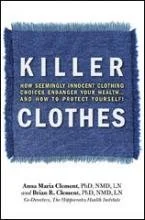 Image 1 of 1
Image 1 of 1


KILLER CLOTHES - How Seemingly Innocent Clothing Choices Endanger Your Health...and How to Protect Yourself!
Anna Maria Clement
Brian Clement
Anna Maria Clement, PhD, NMD, LN and Brian R. Clement, PhD, NMD, LN
This book reveals in unprecedented detail the toxic truth about the clothes we wear and the surprising number of harmful effects on health caused by garments once considered safe. From toxic chemicals like formaldehyde and phthalates to insecticides, flame retardants, and nano-particles, synthetic clothing today contains a toxic stew of dozens of substances that pose a threat to both human and environmental health.
You'll learn:
what fabrics and chemicals to watch for when selecting clothing
how to identify deceptive synthetic fabrics
why to avoid clothing labeled antishrink, antibacterial, antimicrobial, antistatic, anti-odor, antiwrinkle, or antistain
the advantages for choosing natural fabrics
tips for ecological and health-friendly cleaning
Based on medical science, these studies have been brought together for the first time in one place; important findings which have, for too long, been hidden from public awareness.
Excerpt:
6 Good Reasons to Choose Organic Natural Fibers
Eco-friendly and health-friendly organic fibers are grown and organic clothing is produced without the use of
pesticides, herbicides, fungicides, genetic modifications, or other substances and processes that pose a danger
to human health or the environment.Nonorganic and synthetic fibers, by contrast, release chemicals and dyes during production and manufacturing
that damage fragile ecosystems and harm wildlife.Organic natural fibers are recyclable and biodegradable, whereas nonorganics and synthetics don’t easily biodegrade and tend to accumulate in landfills, which poses a disposal problem for future generations.
Because organic fibers aren’t degraded by chemicals during growing and processing, clothing made from these fibers is stronger than nonorganics and has a longer lifespan.
Natural organic fabrics are more absorbable and breathable for your skin than nonorganic and synthetic clothing. See for yourself by comparing how organic cotton feels against your skin on a hot and humid day as opposed to polyester or other synthetic blends.
Natural organic fibers don’t release toxic fumes from chemicals when you wear them, whereas nonorganic synthetics off gas minute amounts of chemicals, which you then absorb through your skin and lungs.
ISBN: 9781570672637
Page Count: 192
Publisher: Hippocrattes Publications
Height: 9.00
Width: 6.00
Anna Maria Clement
Brian Clement
Anna Maria Clement, PhD, NMD, LN and Brian R. Clement, PhD, NMD, LN
This book reveals in unprecedented detail the toxic truth about the clothes we wear and the surprising number of harmful effects on health caused by garments once considered safe. From toxic chemicals like formaldehyde and phthalates to insecticides, flame retardants, and nano-particles, synthetic clothing today contains a toxic stew of dozens of substances that pose a threat to both human and environmental health.
You'll learn:
what fabrics and chemicals to watch for when selecting clothing
how to identify deceptive synthetic fabrics
why to avoid clothing labeled antishrink, antibacterial, antimicrobial, antistatic, anti-odor, antiwrinkle, or antistain
the advantages for choosing natural fabrics
tips for ecological and health-friendly cleaning
Based on medical science, these studies have been brought together for the first time in one place; important findings which have, for too long, been hidden from public awareness.
Excerpt:
6 Good Reasons to Choose Organic Natural Fibers
Eco-friendly and health-friendly organic fibers are grown and organic clothing is produced without the use of
pesticides, herbicides, fungicides, genetic modifications, or other substances and processes that pose a danger
to human health or the environment.Nonorganic and synthetic fibers, by contrast, release chemicals and dyes during production and manufacturing
that damage fragile ecosystems and harm wildlife.Organic natural fibers are recyclable and biodegradable, whereas nonorganics and synthetics don’t easily biodegrade and tend to accumulate in landfills, which poses a disposal problem for future generations.
Because organic fibers aren’t degraded by chemicals during growing and processing, clothing made from these fibers is stronger than nonorganics and has a longer lifespan.
Natural organic fabrics are more absorbable and breathable for your skin than nonorganic and synthetic clothing. See for yourself by comparing how organic cotton feels against your skin on a hot and humid day as opposed to polyester or other synthetic blends.
Natural organic fibers don’t release toxic fumes from chemicals when you wear them, whereas nonorganic synthetics off gas minute amounts of chemicals, which you then absorb through your skin and lungs.
ISBN: 9781570672637
Page Count: 192
Publisher: Hippocrattes Publications
Height: 9.00
Width: 6.00
